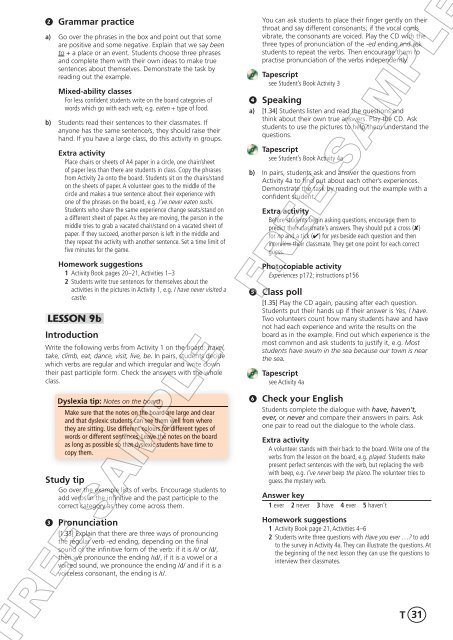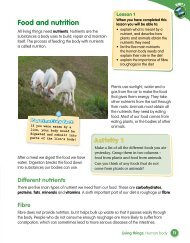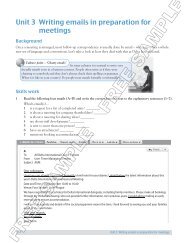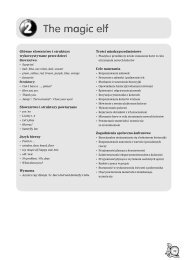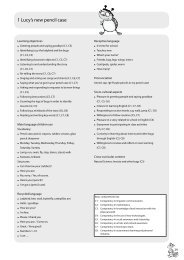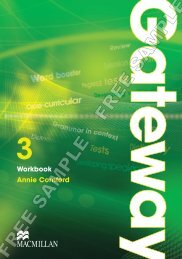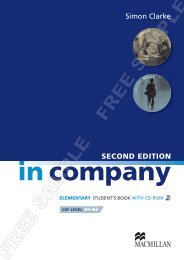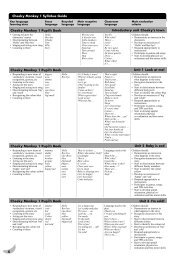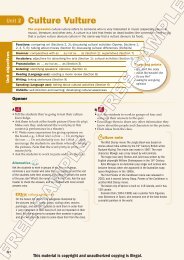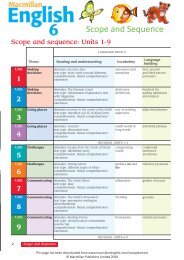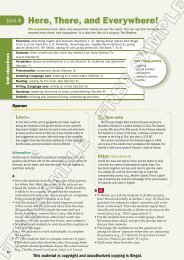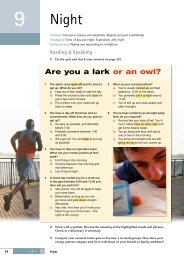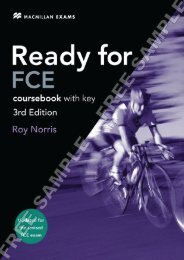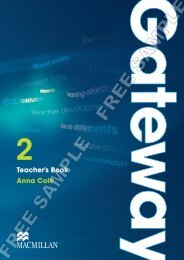9 In my life - Macmillan
9 In my life - Macmillan
9 In my life - Macmillan
Create successful ePaper yourself
Turn your PDF publications into a flip-book with our unique Google optimized e-Paper software.
2 Grammar practice<br />
a) Go over the phrases in the box and point out that some<br />
are positive and some negative. Explain that we say been<br />
to + a place or an event. Students choose three phrases<br />
and complete them with their own ideas to make true<br />
sentences about themselves. Demonstrate the task by<br />
reading out the example.<br />
Mixed-ability classes<br />
For less confi dent students write on the board categories of<br />
words which go with each verb, e.g. eaten + type of food.<br />
b) Students read their sentences to their classmates. If<br />
anyone has the same sentence/s, they should raise their<br />
hand. If you have a large class, do this activity in groups.<br />
Extra activity<br />
Place chairs or sheets of A4 paper in a circle, one chair/sheet<br />
of paper less than there are students in class. Copy the phrases<br />
from Activity 2a onto the board. Students sit on the chairs/stand<br />
on the sheets of paper. A volunteer goes to the middle of the<br />
circle and makes a true sentence about their experience with<br />
one of the phrases on the board, e.g. I’ve never eaten sushi.<br />
Students who share the same experience change seats/stand on<br />
a different sheet of paper. As they are moving, the person in the<br />
middle tries to grab a vacated chair/stand on a vacated sheet of<br />
paper. If they succeed, another person is left in the middle and<br />
they repeat the activity with another sentence. Set a time limit of<br />
fi ve minutes for the game.<br />
Homework suggestions<br />
1 Activity Book pages 20–21, Activities 1–3<br />
2 Students write true sentences for themselves about the<br />
activities in the pictures in Activity 1, e.g. I have never visited a<br />
castle.<br />
LESSON 9b<br />
<strong>In</strong>troduction<br />
Write the following verbs from Activity 1 on the board: travel,<br />
take, climb, eat, dance, visit, live, be. <strong>In</strong> pairs, students decide<br />
which verbs are regular and which irregular and write down<br />
their past participle form. Check the answers with the whole<br />
class.<br />
Dyslexia tip: Notes on the board<br />
Make sure that the notes on the board are large and clear<br />
and that dyslexic students can see them well from where<br />
they are sitting. Use different colours for different types of<br />
words or different sentences. Leave the notes on the board<br />
as long as possible so that dyslexic students have time to<br />
copy them.<br />
Study tip<br />
Go over the example lists of verbs. Encourage students to<br />
add verbs in the infinitive and the past participle to the<br />
correct category as they come across them.<br />
3 Pronunciation<br />
[1.33] Explain that there are three ways of pronouncing<br />
the regular verb -ed ending, depending on the final<br />
sound of the infinitive form of the verb: if it is /t/ or /d/,<br />
then we pronounce the ending /Id/, if it is a vowel or a<br />
voiced sound, we pronounce the ending /d/ and if it is a<br />
voiceless consonant, the ending is /t/.<br />
You can ask students to place their finger gently on their<br />
throat and say different consonants; if the vocal cords<br />
vibrate, the consonants are voiced. Play the CD with the<br />
three types of pronunciation of the -ed ending and ask<br />
students to repeat the verbs. Then encourage them to<br />
practise pronunciation of the verbs independently.<br />
Tapescript<br />
see Student’s Book Activity 3<br />
4 Speaking<br />
a) [1.34] Students listen and read the questions and<br />
think about their own true answers. Play the CD. Ask<br />
students to use the pictures to help them understand the<br />
questions.<br />
Tapescript<br />
see Student’s Book Activity 4a<br />
b) <strong>In</strong> pairs, students ask and answer the questions from<br />
Activity 4a to find out about each other’s experiences.<br />
Demonstrate the task by reading out the example with a<br />
confident student.<br />
Extra activity<br />
Before students begin asking questions, encourage them to<br />
predict their classmate’s answers. They should put a cross (✘)<br />
for no and a tick (✔) for yes beside each question and then<br />
interview their classmate. They get one point for each correct<br />
guess.<br />
Photocopiable activity<br />
Experiences p172; instructions p156<br />
5 Class poll<br />
[1.35] Play the CD again, pausing after each question.<br />
Students put their hands up if their answer is Yes, I have.<br />
Two volunteers count how many students have and have<br />
not had each experience and write the results on the<br />
board as in the example. Find out which experience is the<br />
most common and ask students to justify it, e.g. Most<br />
students have swum in the sea because our town is near<br />
the sea.<br />
Tapescript<br />
see Activity 4a<br />
6 Check your English<br />
Students complete the dialogue with have, haven’t,<br />
ever, or never and compare their answers in pairs. Ask<br />
one pair to read out the dialogue to the whole class.<br />
Extra activity<br />
A volunteer stands with their back to the board. Write one of the<br />
verbs from the lesson on the board, e.g. played. Students make<br />
present perfect sentences with the verb, but replacing the verb<br />
with beep, e.g. I’ve never beep the piano. The volunteer tries to<br />
guess the <strong>my</strong>stery verb.<br />
Answer key<br />
1 ever 2 never 3 have 4 ever 5 haven’t<br />
Homework suggestions<br />
1 Activity Book page 21, Activities 4–6<br />
2 Students write three questions with Have you ever … to add<br />
to the survey in Activity 4a. They can illustrate the questions. At<br />
the beginning of the next lesson they can use the questions to<br />
interview their classmates.<br />
49 T 31<br />
FREE SAMPLE FREE SAMPLE


